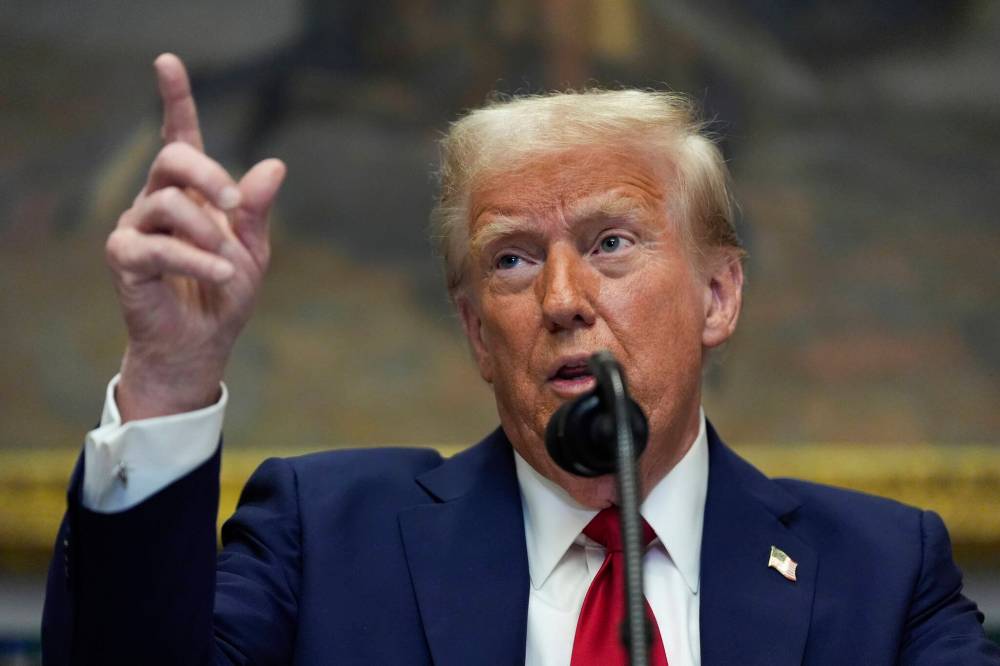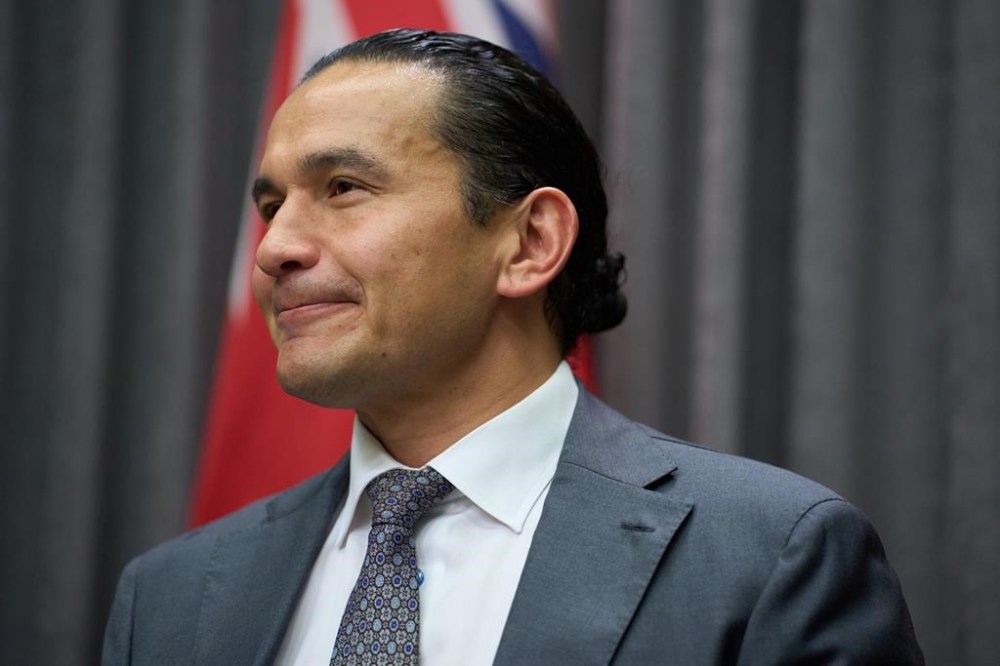Manitoba creates U.S. trade council
‘The main thing is for us to be able to keep that ear to the ground,’ premier says; tariff information hotline to be unveiled Monday
Advertisement
Read this article for free:
or
Already have an account? Log in here »
To continue reading, please subscribe:
Monthly Digital Subscription
$1 per week for 24 weeks*
- Enjoy unlimited reading on winnipegfreepress.com
- Read the E-Edition, our digital replica newspaper
- Access News Break, our award-winning app
- Play interactive puzzles
*Billed as $4.00 plus GST every four weeks. After 24 weeks, price increases to the regular rate of $19.00 plus GST every four weeks. Offer available to new and qualified returning subscribers only. Cancel any time.
Monthly Digital Subscription
$4.75/week*
- Enjoy unlimited reading on winnipegfreepress.com
- Read the E-Edition, our digital replica newspaper
- Access News Break, our award-winning app
- Play interactive puzzles
*Billed as $19 plus GST every four weeks. Cancel any time.
To continue reading, please subscribe:
Add Free Press access to your Brandon Sun subscription for only an additional
$1 for the first 4 weeks*
*Your next subscription payment will increase by $1.00 and you will be charged $16.99 plus GST for four weeks. After four weeks, your payment will increase to $23.99 plus GST every four weeks.
Read unlimited articles for free today:
or
Already have an account? Log in here »
Hey there, time traveller!
This article was published 24/01/2025 (277 days ago), so information in it may no longer be current.
An information hotline, United States trade council and two potential 2025 budgets are among the initiatives Manitoba is taking in the shadow of American tariff threats.
U.S. President Donald Trump has publicly mulled enacting 25 per cent across-the-board tariffs on Canadian imports starting Feb. 1.
JULIA DEMAREE NIKHINSON / THE ASSOCIATED PRESS FILES U.S. President Donald Trump said this week he will impose 25 per cent tariffs on goods from Canada and Mexico starting Feb. 1.
Uncertainty has plagued public and private sectors across the country. Locally, the Manitoba government plans to provide information through a tariff hotline, Premier Wab Kinew said Friday.
The website and phone number will be announced Monday. There will be quick response facts available; more in-depth questions will elicit a response within a day, Kinew pledged.
He’d initially planned to roll out the hotline after — and if — tariffs were imposed. However, Manitoba’s new U.S. trade council encouraged earlier implementation “to provide that reassurance.”
“We’re all hoping that tariffs don’t get applied,” Kinew said at an unrelated news conference. “But if tariffs do get applied, this would be your hotline to call in terms of support.”
Manitoba’s U.S. trade council was announced Friday; it convened earlier this week. Sixteen leaders — from the private sector, business associations and labour groups — will provide advice and share concerns with the premier.
“The main thing is for us to be able to keep that ear to the ground,” Kinew said, adding the council has “a good cross-section of people.”
“The main thing is for us to be able to keep that ear to the ground.”–Premier Wab Kinew
Many of the council members sit on a U.S. trade relations subcommittee of the premier’s business and jobs council, noted Loren Remillard, president of the Winnipeg Chamber of Commerce. (He has a seat on both councils.)
Before Trump’s tariff threats, the group had been discussing ways to enhance its relationship with America, Remillard said. “Those conversations took on a sense of urgency.”
Nearly $42 billion worth of goods trade between Manitoba and the United States annually, Canadian Chamber of Commerce data show. Some 1,800 Manitoba companies export to the U.S.
Many Winnipeg businesses have paused investment while waiting to see what Trump will do and how Canada may respond. It follows a country-wide trend, Remillard said.
Council members can relay information from the premier to their own membership and industries. They may also get a say at the national level, Remillard highlighted.
“Our premier is a well-respected voice around the (federal-provincial) table,” he said. “The more we can help him carry the Manitoba message forward … the stronger our position around the table will grow.”
Premier Wab Kinew emphasized the focus is “strengthening and trying to preserve a good trading relationship.”

Kinew will join fellow premiers in Washington, D.C., on Feb. 12 to make their case to the U.S. administration. He travelled to Ottawa on Jan. 15 to meet with his national counterparts before Trump’s inauguration.
Several of Manitoba’s U.S. trade council members applauded the diversity of perspectives enlisted for the council.
“What might be a great solution for our industry in bioscience might not be the right fit for someone in a different industry,” said Andrea Ladouceur, president of the Bioscience Association of Manitoba.
Chemicals are among Manitoba’s top exports to the United States. Ladouceur is looking beyond tariffs — for medicine, there’s oversight and “extra due diligence” needing consideration when exporting outside Canada. These challenges go “hand in hand” with tariff concerns, she said.
Kevin Rebeck, Manitoba Federation of Labour president, said he’ll keep income protection, employment insurance changes and job stimulus projects part of the discussion should tariffs come, causing work slowdowns and stoppages.
“I think there’ll be a common call from all the members of this council … to say, ‘How do we keep our economy strong and going?’” Rebeck added. “There’s a lot of good people on that council.”
“There’s a lot of good people on that council.”–Kevin Rebeck, Manitoba Federation of Labour president
Mining, manufacturing and agriculture are among the industries represented.
Now is a good time for Manitoba to take a mirror to itself and grow its economy, said Chuck Davidson, Manitoba Chambers of Commerce president and a trade council member.
“We need to start having more of a focus in Manitoba on things that we can control.”
This could include investing more in critical minerals and green energy and reducing reliance on the United States, he said. Already, Manitoba businesses importing goods from the United States have been looking to increase sourcing within Canada’s bounds and from Europe.
Manitoba could face an investment chill if tariffs come, noted Ryan Kuffner, chief executive of Economic Development Winnipeg (and a trade council member). Foreign and domestic investors often spend money in Canada for access to the U.S. market.
“It doesn’t mean the companies wouldn’t continue to advance their plans to invest in Canada,” added Kuffner, a former Canadian trade diplomat.
“Manitoba’s engagement has been sporadic and not strategic.”–Carlo Dade, Canada West Foundation director of trade and trade infrastructure
Kinew dodged questions about how much Manitoba’s GDP may be affected by sweeping U.S. tariffs. He emphasized the focus is “strengthening and trying to preserve a good trading relationship.”
“Now is an important time for us to spend our money to support our economy here,” Kinew encouraged Manitobans.
The government is essentially drafting two budgets within its 2025 budget, he continued: one for “all systems go” on trade with the United States and another where Manitoba must support businesses and respond to economic slowdowns.
The budget will be released in the spring. Manitoba’s trade office in Washington’s Canadian embassy is likely to open during the same season.
Manitoba has “dropped the ball” on U.S. relations since Gary Doer was premier in the 2000s, said Carlo Dade, Canada West Foundation director of trade and trade infrastructure.
(Kinew tapped Doer to advise the New Democrat government on trade with the United States before being elected premier in 2023.)
Dade called the new U.S. trade council “good,” but “a decade late.”
“Manitoba’s engagement has been sporadic and not strategic,” the think tank director said. “I’m not saying they haven’t done anything. I’m just saying what they’ve done hasn’t been commensurate with the importance of the relationship.”
An occasional visit to Washington “doesn’t cut it.” Alberta, Ontario and Quebec have held trade offices in America’s capital for ages, Dade said.
Prime Minister Justin Trudeau launched the Council on Canada-U.S. Relations, comprised of business and policy leaders, earlier this month. A voluntary Canada U.S. Trade Council including industry, associations and labour organizations also formed in January.
— with files from Carol Sanders
gabrielle.piche@winnipegfreepress.com

Gabrielle Piché reports on business for the Free Press. She interned at the Free Press and worked for its sister outlet, Canstar Community News, before entering the business beat in 2021. Read more about Gabrielle.
Every piece of reporting Gabrielle produces is reviewed by an editing team before it is posted online or published in print — part of the Free Press‘s tradition, since 1872, of producing reliable independent journalism. Read more about Free Press’s history and mandate, and learn how our newsroom operates.
Our newsroom depends on a growing audience of readers to power our journalism. If you are not a paid reader, please consider becoming a subscriber.
Our newsroom depends on its audience of readers to power our journalism. Thank you for your support.
History
Updated on Friday, January 24, 2025 5:45 PM CST: Adds details, comments, fact box.








